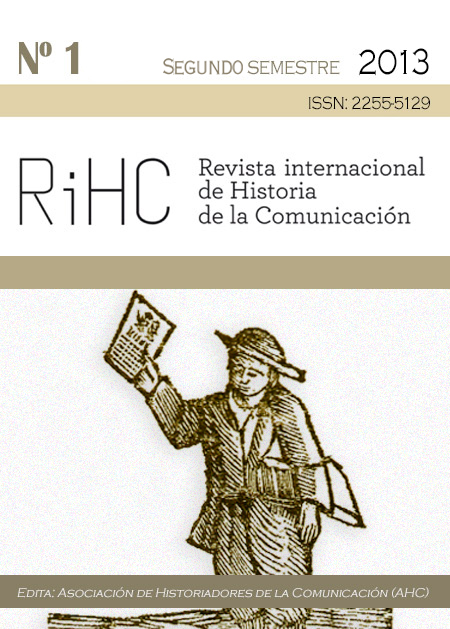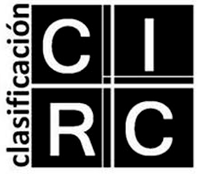A I república portuguesa na imprensa internacional: A voz italiana do dissenso
DOI:
https://doi.org/10.12795/RiHC.2013.i01.06Keywords:
Portugal, Republicanismo, Periodismo, Opinión PúblicaAbstract
Los acontecimientos del 5 de octubre 1910 colocaron Portugal en el centro del debate político y de la agenda informativa internacional. Las repercusiones se han extendido un poco por toda Europa y han provocado reacciones contradictorias. En este artículo se analiza el impacto de la implantación de la I República portuguesa en la prensa italiana y como esta fue relatada en el discurso editorial, con especial enfoque en el encuadramiento discursivo de las corrientes de opinión contrarias al orden político republicano.
Downloads
References
AUSTIN, JOHN – How to do Things with Words. London: Oxford University, 1962.
BATTISTA, PIERLUIGI – L’Italia Contemporanea: dal 1963 a oggi, vol. VI. In Storia d’Italia, Giovanni Sabbatucci e Vittorio Vidotto (dir.) Roma: Laterza, 1999.
BECHELLONI, GIOVANNI – Informazione e potere: la stampa quotidiana in Italia. Roma: Officina, 1974.
BENETTI, MARCIA – “Análise do Discurso em jornalismo: estudo de vozes e sentidos”. In Metodologias de Pesquisa em Jornalismo, Cláudia Lago e Marcia Benetti (coord.). Petrópolis: Vozes, 2007.
BOURDIEU, PIERRE – O poder simbólico. Lisboa: Difel, 1989.
BRIGANTI, ALESSANDRA – Intellettuali e cultura tra Ottocento e Novecento: nascita e storia della terza pagina. Padova: Liviana, 1972.
CASTRONOVO, VALERIO – “Stampa e opinione publica nell’Itália liberale”. In Storia della stampa italiana. La stampa italiana nell’età liberale, Valerio Castronovo e Nicola Tranfaglia (coord.). Bari: Laterza, 1979.
CATROGA, FERNANDO – O Republicanismo em Portugal: da formação ao 5 de Outubro de 1910. Lisboa: Editorial Notícias, 2000.
CHAPARRO, MANUEL CARLOS – Pragmática do jornalismo: buscas práticas para uma teoria da ação jornalística. São Paulo: Summus, 1994.
DE BERNARDI, ALBERTO; GANAPINI, LUIGI – Storia d’Italia: 1860-1995. Milano: Bruno Mondadori, 1996.
FALQUI, ENRICO – Nostra Terza Pagina. Roma: Canesi, 1964.
FOUCAULT, MICHEL (1970) – A ordem do discurso. Lisboa: Relógio de Água, 1997.
FOWLER, ROGER – Language in the news. Discourse and Ideology in the Press. London:
Routledge, 1994.
GALTUNG, J. E RUGE, M. H. – “The structure of foreign news”, in Journal of International Pace Research, nº 1. SAGE Journals, 1965.
GANS, HERBERT J. - Deciding what's news. New York: Vintage Books, 1980.
GENTILE, EMILIO (et. al.) – Novecento Italiano. Bari: Latterza, 2008.
GOFFMAN, ERVING – Frame Analysis: an Essay on the Organization of Experience. Boston: Northeastern University Press, 1986.
GRANDINETTI, MARIO – La Stampa da 1945 ad oggi: un giornale, un’azienda. Torino: Gutenberg, 1996.
HOMEM, AMADEU CARVALHO – A Propaganda Republicana (1870-1910). Coimbra. Coimbra Editora, 1990.
LICATA, GLAUCO – Storia del Corriere della Sera. Milano: Rizzoli, 1976.
LOUREIRO, JOÃO BERNARDO DA ROCHA – Nas origens do periodismo em Portugal: Cartas a Orestes. Coimbra: Minerva Coimbra, 2009.
MESQUITA, MÁRIO – “Portugal na Primeira Página”. In O 25 de Abril nos média internacionais, Mário Mesquita e José Rebelo. Porto: Afrontamento, 1994.
MESQUITA, MÁRIO; REBELO, JOSÉ – O 25 de Abril nos média internacionais. Porto: Afrontamento, 1994.
MONICO, RETO; VIEIRA, JOAQUIM – República em Portugal!: o 5 de Outubro visto pela imprensa internacional. Almoçageme: Pedra da Lua, 2010.
MURIALDI, PAOLO – Storia del giornalismo italiano. Bolonha: Mulino, 2006. NETO, VÍTOR – O Estado, A Igreja e a Sociedade em Portugal (1832-1911). Lisboa: Imprensa Nacional Casa da Moeda, 1998.
PARELMAN, CHAÏM (1977) – O império retórico: retórica e argumentação. Lisboa: ASA, 1999.
RAMOS, RUI – A Segunda Fundação (1890-1926), vol. VI In História de Portugal, José Matoso (dir.). Lisboa: Círculo de Leitores, 1994.
TARDE, GABRIEL (1901) – A opinião e a multidão. Mem Martins: Europa América, 1991.
TRAQUINA, NÉLSON – Jornalismo. Lisboa: Quimera, 2002.
VAN DIJK, TEUN A. (1988) – La Noticia como Discurso. Barcelona: Paidós, 1990.
(1995) – Racismo y Análisis Crítico de los Medios. Barcelona: Bosch
Comunicación, 1997.
– Discurso, Notícia e Ideologia. Porto: Campo das Letras, 2005.
WOLF, MAURO (1985) – Teorias da Comunicação. Lisboa: Editorial Presença, 2001.
LA TRIBUNA
– Malagodi, Olindo, La repubblica inevitabile, 10 outubro 1910, 1.
LA STAMPA
– Murri, Romolo, Concludendo, 22 outubro 1910, 1.
IL SECOLO
– Ciràolo, Giovanni, Il pericolo, 11 outubro 1910, 1.
– Bistolfi, Giovanni, Le cause economiche della rivoluzione, 7 outubro 1910, 2.
– Schinetti, Pio, La repubbica, 6 outubro 1910, 1.
L’UNIONE
– Mentre sorge la Repubblica, 7 outubro 1910, 1.
– In attesa, 8 outubro 1910, 1.
– La Repubblica di Augusto Comte?, 10 outubro 1910, 1.
– La massoneria al lavoro, 11 outubro 1910, 1.
– Il Trionfo della demagogia, 12 outubro 1910, 1.
L’OSSERVATORE ROMANO
– La massoneria: ecco il nemico!, 6 outubro 1910, 1.
– Buona fede!, 12 outubro 1910, 1.
CORRIERE DELLA SERA
– L’aurora grigia, 7 outubro 1910, 1.
LA TRIBUNA
– Una nuova Repubblica, 7 outubro 1910, 1.
LA STAMPA
– L’esempio del Portogallo, 11 outubro 1910, 1.
IL SECOLO
– Le nostre leggi, 12 outubro 1910, 1.
AVANTI!
– La fine della dinastia di Braganza, 6 outubro 1910: 1.
Downloads
Published
How to Cite
Issue
Section
License
RiHC. Revista internacional de Historia de la Comunicación is an open access publication, offering its content under the principle that making research available to the public free of charge contributes to the greater exchange of global knowledge.
RiHC. Revista internacional de Historia de la Comunicación adheres to the various initiatives that promote access to knowledge. All content is therefore free of charge and is published under the Creative Commons Attribution-NonCommercial-ShareAlike 4.0 International license.
By virtue of this, the authors who publish in this journal accept the following conditions:
- Open access content may be freely shared (that is, copied and redistributed in any medium or format) and adapted (remixed, transformed and built upon).
- Attribution: The user of the content must give appropriate credit, provide a link to the license, and indicate if changes were made. This may be done in any reasonable manner, but not in any way that suggests the licensor endorses the user or their use.
- Non Commercial: The content may not be used for any commercial purpose.
- Share Alike: If the content is remixed, transformed or built upon, it must be distributed under the same licence as the original.
- No additional restrictions: No legal terms or technological measures may be applied that legally restrict others from doing anything the licence permits.














